You found our list of top coaching books.
Coaching books are nonfiction works that teach leaders how to guide and inspire individuals and groups. These books cover topics such as asking practical questions, delivering feedback, and motivating teams. The purpose of these works is to help leaders provide better guidance and improve employee performance.
These guides are a subset of management books and leadership books and are similar to books on motivation and books on mentorship.
This list includes:
- leadership coaching books
- business coaching books
- coaching books for managers
- coaching books for beginners
Here we go!
List of coaching books
Here is a list of books to improve coaching skills to better support employee growth.
1. The Coaching Habit: Say Less, Ask More & Change the Way You Lead Forever by Michael Bungay Stanier
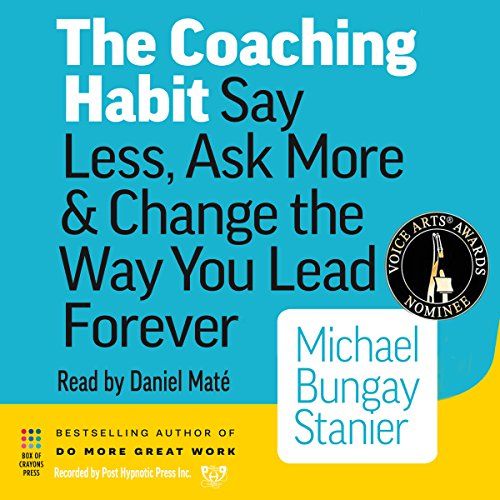
The Coaching Habit is one of the best coaching books for managers. This guide shows leaders how to work coaching into their standard routines so that the act becomes instinct. The book presents seven key types of coaching questions that produce pointed conversations that improve performance. Bungay backs up these recommendations with science and business research, yet the tone of the book is simple, straightforward, and enjoyable. The Coaching Habit shows how to make coaching second nature and give employees continual support.
Notable Quote: “When you build a coaching habit, you can more easily break out of three vicious circles that plague our workplaces: creating over-dependence, getting overwhelmed and becoming disconnected.”
Read The Coaching Habit, and check out more books on building habits.
2. The Coaching Effect : What Great Leaders Do to Increase Sales, Enhance Performance, and Sustain Growth by Bill Eckstrom and Sarah Wirth
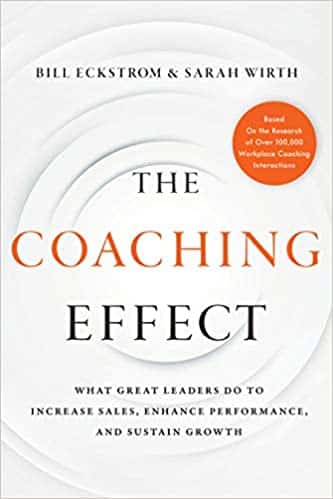
The Coaching Effect is one of the most useful leadership coaching books. The authors spent years studying thousands of workplace interactions, and relay the findings of that research in this guide. The book identifies common characteristics and behaviors of great coaches, for instance regular 1:1 meetings and comprehensive career planning. The text gives readers advice on how to follow these examples, and the end presents a four-step process to help frame and guide the development journey. The Coaching Effect creates a composite of the ideal coach by pointing out the behaviors proven to get the best results.
Notable Quote: “High growth coaches are not afraid to push, to demand, and to challenge to get their teams to perform. They don’t shy away from making their team members uncomfortable. In fact, they relish it because they consciously or subconsciously know that growth can only occur in a state of discomfort.”
Read The Coaching Effect.
3. Performance Conversations: How to Use Questions to Coach Employees, Improve Productivity, and Boost Confidence (Without Appraisals!) by Christopher Lee
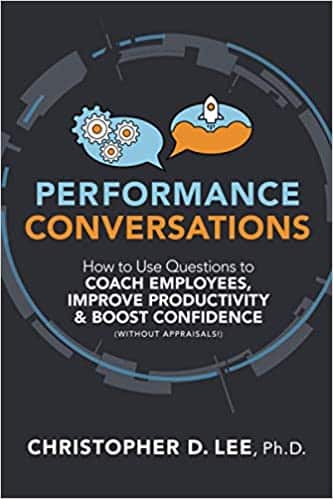
Performance Conversations is a guide to discussing the quality of work and the possibility for improvement. As the title suggests, the book gives readers an arsenal full of helpful types of questions to ask to guide these conversations. For example, “what is going well?” “what can I do for you?” and “how are your professional relationships going?” The appendix contains a collection of more complex questions for situations like talking to a difficult employee, speaking to a manager, or preparing for a sale. The guide also includes several checklists to help coaches ensure they touch on all necessary key points. Performance Conversations is a helpful resource for structuring coaching sessions that can help leaders get the most out of these talks.
Notable Quote: “The skill of questioning– asking the right questions in the right way the the right time– should also rank highly on the list of required skills of any manager. This is because questioning is so vital to learning, understanding, gathering information, solving problems, and conducting quality control.”
Read Performance Conversations, and check out this list of checking-in questions.
4. Co-Active Coaching: The proven framework for transformative conversations at work and in life by Karen Kimsey-House, Henry Kimsey-House, et al
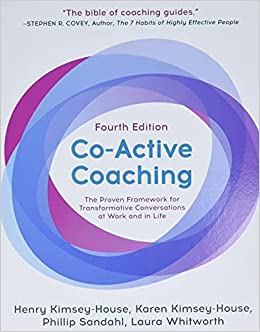
Co-Active Coaching is one of the more helpful coaching books for beginners. The guide breaks down the fundamentals of coaching and provides models for having constructive discussions and building strong relationships. The book gives tips on active listening, people-reading, and deepening engagement, and shows readers how to combine the principles of good coaching in practice. Co-Active Coaching acts as a handbook that hits the key points of guiding employees and builds a firm foundation for new leaders to build upon.
Notable Quote: “The two products of the work the coachee and coach do together—action and learning—combine to create change.”
Read Co-Active Coaching.
5. Helping People Change: Coaching with Compassion for Lifelong Learning and Growth by Richard Boyatzis, Melvin L. Smith, and Ellen Van Oosten
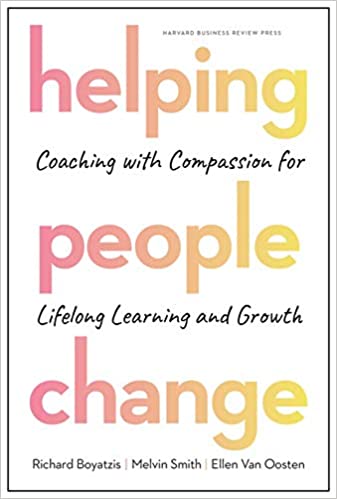
Helping People Change offers a crash course in empathetic leadership. While many coaching books focus on troubleshooting techniques, this book emphasizes that a key part of behavior change is understanding and appealing to the other person’s feelings and viewpoints. The guide gives practical tips and advice for helping others grow, such as asking questions that uncover passions, nurturing sustained change, and recognizing coachable moments. Helping People Change teaches a human-first approach to coaching and helps leaders learn how to connect with employees on an emotional level.
Notable Quote: “In our attempt to coach a person needing help, most of us naturally take a problem-centered approach, focusing on the gaps between where they are and where we think they should or could be. We are trying to fix them. This does not work well, if alt all, to motivate sustained learning, change, or adaption.”
Read Helping People Change.
6. Coaching Salespeople into Sales Champions: A Tactical Playbook for Managers and Executives by Keith Rosen
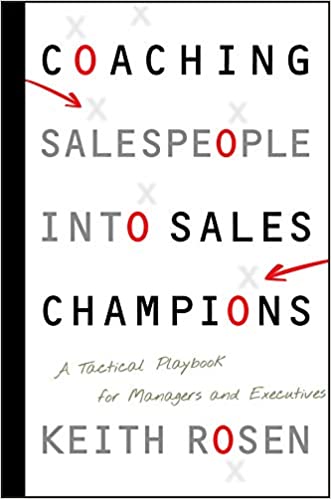
Coaching Salespeople into Sales Champions is a guide for sales coaches to improve employee performance. The book defines the differences between sales managers and sales coaches, points out traits and tactics of effective coaches, shows coaches how to develop sales teams, and lays out formulas for influencing great results. The sections offer helpful guidelines like “six universal principles of masterful coaching” and “six fatal coaching mistakes and how to avoid them,” as well as instructions for launching a structured sales coaching program within the organization. Keith Rosen covers the full scope of the practice from attitude to technique and organizes these insights into a straightforward, easy to understand manual. Coaching Salespeople into Sales Champions is the ultimate guide to tailoring the coaching approach to fit the sales industry.
Notable Quote: “If you do not have a defined process that moves your people forward so the can achieve greater results, then what is it you are managing?”
Read Coaching Salespeople into Sales Champions, and check out more books on sales.
7. The HeART of Laser-Focused Coaching: A Revolutionary Approach to Masterful Coaching by Marion Franklin
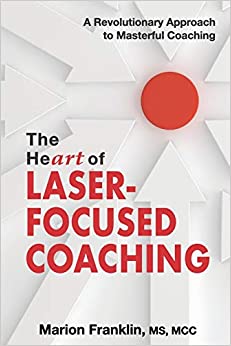
The HeART of Laser-Focused Coaching presents a method for more intentional and direct coaching. These techniques help leaders detect and hone in on important matters, and fulfill coachees’ needs more effectively. The book gives tips on reading people, picking up on subtle conversation cues, recognizing patterns, and adopting a big-picture approach to problem solving. Marion Franklin shows how to pinpoint what matters most and help coachees define and achieve those goals. The book suggests ways to structure questions and communicate to arrive at the core of the issues, and also presents ways to overcome challenges. Though The HeART of Laser-Focused Coaching is primarily written for career coaches, managers can also benefit from the advice.
Notable Quote: “Acknowledging: “Thanks for sharing that information.” Affirming: “Thanks for sharing that information because it helps me better understand your mindset.”
Read The HeART of Laser-Focused Coaching.
8. Multipliers: How the Best Leaders Make Everyone Smarter by Liz Wiseman
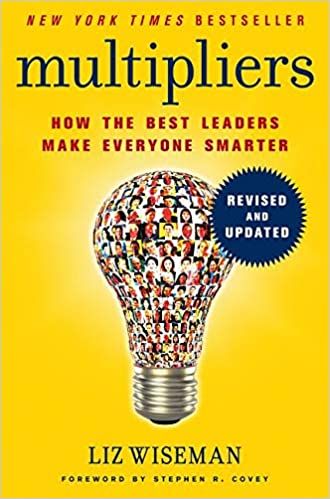
Multipliers is one of the best leadership coaching books. This book explores how great leaders bring out the best in their surrounding circles and unlock employees’ true potential. The narrative analyzes the behaviors that help leaders amplify their staff’s abilities and outputs. Throughout the book, Liz Wiseman compares and contrasts two types of leaders: the multipliers, who drive employees to exceed expectations and constantly improve, and the diminishers, who dampen their staff’s shine. The pages explain how to avoid being a diminisher and embrace the multiplier leadership style. Chapters include case studies that show these principles in action, and the book lays out practical steps to show employees you believe in them, get them to believe in themselves, and foster exponential employee growth.
Notable Quote: “It isn’t how much you know that matters. What matters is how much access you have to what other people know. It isn’t just how intelligent your team members are; it is how much of that intelligence you can draw out and put to use.”
Read Multipliers.
9. Coaching for Performance: The Principles and Practice of Coaching and Leadership by Marcia Reynolds
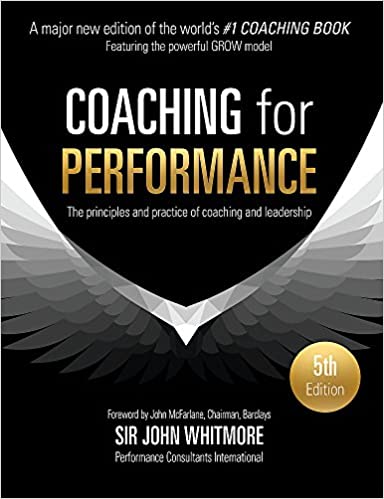
Coaching for Performance is one of the top business coaching books. The guide presents tactics and best practices for getting coachees to do their best work. The pages give tips on creating a performance culture, guiding team performance, making the process a partnership, and measuring the impact of the experience. The book lays out a framework called GROW to structure the coaching process, and ends with a toolkit of questions and exercises to help readers master the craft. Coaching for Performance outlines a results-driven approach to coaching and breaks down the basics of managing and supporting performance.
Notable Quote: “Adult learning theory tells us that adults learn in a completely different way to children. Self-belief is central to this. Coaching is adult learning in practice and is both what leaders need and the direction in which leadership style needs to travel.”
Read Coaching for Performance.
10. The Talent Code: Greatness Isn’t Born. It’s Grown. Here’s How. by Daniel Coyle
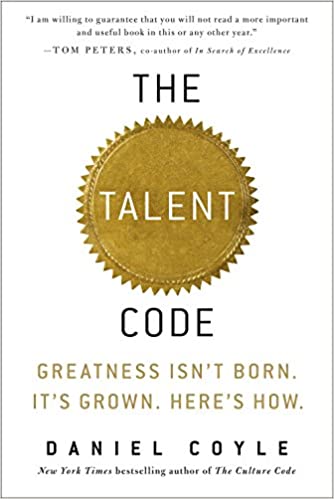
The Talent Code analyzes the elements that foster and fast-track growth. Using a journalistic approach, Daniel Coyle explores a handful of “talent hotbeds,” across the world, and analyzes the environments to pick out patterns and characteristics that enable excellence. The book identifies three main factors for extraordinary talent development– deep practice, ignition of passion, and master coaching– and shows leaders how to cultivate these conditions. Coyle backs up his anecdotes and advice with scientific evidence, particularly with neurological research. The Talent Code is a technical manual for enhancing employees’ abilities and building a learning environment.
Notable Quote: “Master coaching is something more evanescent: more art than science. It exists in the space between two people, in the warm, messy game of language, gesture, and expression.”
Read The Talent Code, and check out more training and development books.
11. The Advice Trap: Be Humble, Stay Curious & Change the Way You Lead Forever by Michael Bungay Stanier
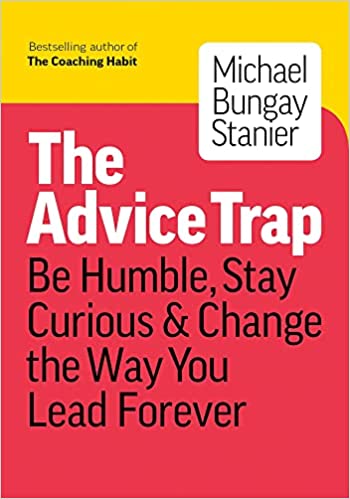
The Advice Trap shows that coaching is just as much about listening as directing. The book encourages leaders to overcome the instinct to immediately give advice, and instead ask thoughtful questions to gather more information and help the employee arrive at their own solution. This guide helps coaches examine whether or not they are over-advising team members and make sustainable changes in these behaviors. The book lays out a practical toolkit for coaching more effectively, with tips and actionable advice. Each chapter alternates with a masterclass exercise that helps readers practice and perfect the discussed skills. The Advice Trap shows leaders that their people are their most valuable coaching asset and explains how to make the best use of that resource.
Notable Quote: “Generous silence provides space for the other person to be with their own self, for you to be with them, for presence to show up. It allows them to take a breath. It whispers, “This is an interesting place to be. Let’s hang out here for a moment.”
Read The Advice Trap.
Final Thoughts
The art of coaching is deceptively difficult to master. Many first time managers make the mistakes of micromanaging and barking orders or swooping in to play savior. In fact, even experienced leaders sometimes fall into this trap. However, the role of a leader is to help learn and grow and set down the right path, not to do the work for the staff. Good leaders make employees think and create environments where team members can grow and thrive.
Coaching books teach leaders how to influence employees and instill the skills needed for success in the professional world. These guides can help coaches make an impact on less experienced colleagues’ careers and lives, which is one of the most rewarding parts of the coaching process.
Next, check out this list of management skills, this list of tips for first time managers and these mentorship program ideas for the office.
We also have a list of tips for giving employee feedback, list of employee coaching examples and a list of employee coaching styles.
